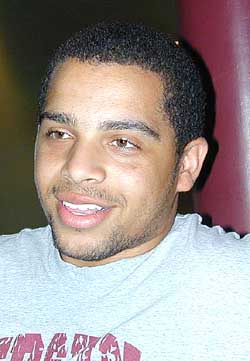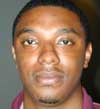|
 From WKCD Feature Story: Students Who Teach
From WKCD Feature Story: Students Who Teach |
Hear sound clips
and read transcripts from interviews with student teachers from the Algebra Project

Areius, 16,
Marvel,
Arkansas
|
Listen with: Real Player
or .wav
“Some people when they grow up they kind of lag off on math, so we intend to brush them up on their math skills,
and kind of inspire them to keep doing math. But I love algebra, there’s nothing that could replace algebra to me.
If people are like, you’re not going to be good at anything, you can’t do algebra or whatever, it just makes me want to
try harder to do algebra. When we go places and talk to people, you can see in their faces that they’re understanding
what you’re talking about. Black people a long time ago they could not even read or they would be in trouble with
their master. Now we know that since we do finally have our civil rights, he’s going to show us that algebra and
civil rights can connect, ’cause now we know how to do—we read and do math and everything.” — Arieus, 16
|

Derrick, 21,
Fayetteville,
NC; seventh
year with the
Algebra Project
|
Listen with: Real Player
or .wav
“Usually every summer we watch the documentaries on the civil rights movement, and then I look at people like
David Dennis, who’s a retired lawyer, and Bob Moses and they come back and they give back to the community
when they really don’t have to, because they’re well taken care of. So if I can come in and take two, three weeks
out of my summer to provide, be a role model and facilitator so they can go back to help their community, I feel that it’s worth it.”
— Derrick, 21
“We’re always talking about the technology gap, and how blacks aren’t as far along in technology. So if we give
these kids a good background in algebra, which leads to the higher math program, getting them involved in calculus
and physics and biology and the science fields, which there aren’t many minorities in, then once we get more into the
technology-based fields, it will lead to empowerment. If they don’t feel comfortable by the time they get through algebra 2,
I think they’ll steer away from the whole technology field.” — Derrick, 21
|

Stargell, 21,
Bennettsville,
SC; seventh
year with the
Algebra Project
|
Listen with: Real Player
or .wav
“I think that they categorize kids at an early age, whether or not they think you’re going to make it and
you’re not...I know at my school there were only like two African-American males who actually took calculus
in our whole entire high school, that was myself and another person. And at an early age I noticed that myself
and the other person were always, were lucky enough to be put in that top level, which was mostly filled with
Caucasians, and so I believe it starts at an early age. I hope this program wakes up some of the kids to
question, you know, why can’t I take calculus class, or why can’t I take a tougher curriculum, so I can get ahead?” — Stargell, 21
|
|
|